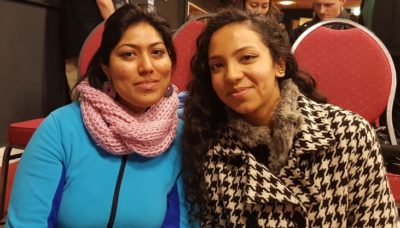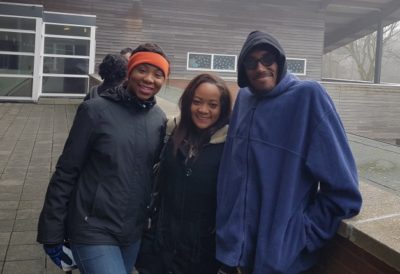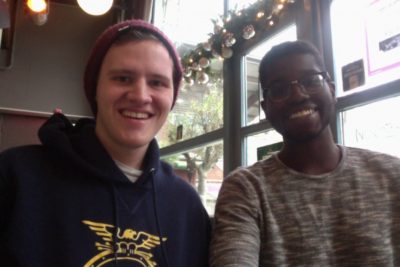Debaters at WUDC – Part 1
The first day of the World University Debating Championship 2017 in The Hague is coming to an end and of course the Achte Minute was there and interviewed some of the participants from all around the world. Today seven people from three continents were interviewed and more will be coming the following days. Interviewing for the Achte Minute was Helena Hecke.
In this part you can find the interviews with:
Pradeepta Adhikari and Shreya Josmi – Nepal
Roshelle Pinnock, Patrice Minto and Germaine Barrett – Jamaica
Tyler Whitney and Lemuel Daher, Northwest University Kirkland – USA
Pradeepta Adhikari and Shreya Josmi – Nepal

Pradeepta Adhikari and Shreya Josmi – Nepal – © Helena Hecke
AM: Where exactly are you from and at which society are you debating at?
PA: I’m from the Tribhuvan University in Nepal.
SJ: I study at the Kathmandu University School of Law. We don’t really have debating societies.
AM: How much debating experience do you have?
PA: I’ve debated for two years so far.
SJ: I don’t really debate frequently, but I’m working as a debate trainer at Debate Network Nepal, which is the biggest debating organisation in Nepal.
AM: Have you been to Worlds before?
SJ: It’s the first Worlds for the two of us.
AM: Why did you start debating?
PA: We started to debate whilst A-Levels, when trainers started to do it and brought it to Nepal and also us. That was about two years ago. Additionally we started watch YouTube video of debate. Before that there was no debating in Nepal.
AM: Why are you still debating?
PA: Mainly because I love it. I see it as a way to engender democracy and to raise awareness and understanding. Through debating I think that I’m becoming a more unbiased person and overall just a better person.
SJ: I agree and additionally it is a possibility to hear the other side of a story and makes me a better listener.
AM: How is the debating circuit in Nepal?
SJ: It is a outside community away from university and schools. We have two organisations, which are mainly centred on public speaking. Non-debaters don’t understand what we’re doing and think we’re screaming at each other and what we want to do is to change this stereotype. People seem to think debaters are rude and argumentative. My aunt said that I’ll have “many fights with my mother in law”, because I’m a debater. We want to change this stigma.
AM: How many tournaments are happening in your circuit?
PA: We have two tournaments. One is a World Schools tournament, which functions as the trials for WSDC and the second one is a BP tournament.
AM: How does a typical tournament look like in your circuit.
PA: It takes part in different schools. We try to copy worlds as much as possible, since we don’t have that much experience on how a tournament has to look like, because there only has been debating in Nepal for two years. Unfortunately we have a significantly smaller budget. So basically we have Worlds in tiny with low budget.
SJ: We also provide a lot of workshops, because not many people actually know what debating is supposed to be and how it functions.
AM: How would you describe debating in maximum six words?
SJ: Clash of ideas.
PA: Evaluating ideas, coming and leading to a solution.
AM: Lastly, although it’s the first day of worlds: What is your impression of Worlds so far?
PA: It’s really exciting. We want to see different views around the worlds. The situations are just so different, and the arguments given. Especially what people fight for. In Europe it seems to be mainly about rights and that the people can thrive, whilst we mainly argue for basic needs.
AM: Thank you so much and I hope you’ll enjoy Worlds.
Roshelle Pinnock, Patrice Minto and Germaine Barrett – Jamaica

Roshelle Pinnock, Patrice Minto and Germaine Barrett – Jamaica – © Helena Hecke
AM: Where exactly are you from and what society are you debating at?
GB: The two of them are from the University of Technology, Jamaica, and their debating society is called UTECH Debating and Public Speaking Society. I’m a coach at the Jamaican Association for debating and empowerment (JADE) limited.
AM: To the two of you: How much debating experience do you have so far and how many competitions did you go to?
PM: For about one and a half years and I went to two international tournaments so far, including worlds and went to one local tournament. I became second in the local tournament.
RP: I’ve started debating in high school. So I’ve been debating for two years now. I went to one national tournament and this is my first international tournament.
AM: Why did you start debating in the first place?
RP: To become a better speaker and because I love public speaking
PM: Someone saw in me that I could be a debater before I did and basically forced me to go to a debating session.
AM: Why did you continue debating?
RP: Mainly for my intellect and to learn to reason better, which is good for life.
PM: I agree and of course because I developed a passion for it.
AM: What is so special about your circuit?
PM: It has a lot of humour and very charismatic people. Also it’s very fierce and competitive.
GB: It is ever growing.
AM: How does a typical tournament look like in your cicuit?
PM: The weather is always good!
RP: We mainly have one day tournaments.
GB: Also it’s happening in high schools, not university. We use the BP format, too.
AM: What do you enjoy most about debating?
RP: The people and to get to know different cultures.
PM: To be able to understand and engage with different ideologies and that I constantly study. I also love the participation and exposure.
AM: If you’d have to explain debating to a complete “outsider” in just six words. Which would you use?
RP: Life changing, impactful, purposeful.
PM: Something they won’t regret and will see continuously growing in themselves.
AM: Lastly: What is the most striking experience you’ve had so far at worlds?
Both: The cold weather.

Tyler Whitney and Lemuel Daher – © Helena Hecke
Tyler Whitney and Lemuel Daher, Northwest University Kirkland – USA
AM: At which University are you debating?
TW: We’re at the Northwest University in Kirkland, which is basically Seattle.
AM: How many years have you debated so far and to how many tournaments did you go to?
TW: I’ve debated for three years.
LD: I debated for three and a half years so far.
TW: We go to around seven tournaments per semester, so we’ve been at about 30 tournaments so far.
AM: Did you break at some of the tournaments?
TW: Yes. We broke at about four of the tournaments.
AM: Have you been at Worlds before?
LD: It’s the first Worlds for both of us.
AM: Why did you start debating in the first place?
TW: I enjoy discussions and critical avocation. Also I always loved to read. So debating just was a natural fit in order to learn stuff.
LD: I do my major in communications and my parents are professors and they recommended debating to me in order to help improve my speaking style and other professors agreed.
AM: So why did you continue to debate?
LD: Mainly the community on the team and the friends I made. Also I’m an Canadian citizen. So debating is a chance for me to see other states.
TW: I enjoy the familiar aspect and the travelling. I get to see many new places.
AM: How many tournaments are happening in your circuit and what do they look like?
TW: Our circuit is mainly the West Coast up to Canada and we’re debating in BP mostly.
LD: They consist of 60 teams normally, sometimes a little smaller. In our circuit, which is mainly British Columbia and Washington, there are 6 to 9 and we twice go outside and to the nationals and worlds. Also we host one.
AM: How do your tournaments differ from worlds?
TW: It’s significantly less international. Canadians are the most international exposure we get.
LD: Apart from that it doesn’t differ that much.
AM: How would you describe debating to an “outsider” in just six words?
LD: Challenging and pushing yourself to conclusions.
TW: Engaging in the important discussions of the day.
AM: What’s your impression of Worlds so far?
TW: Meeting people we’ve never imagined to meet otherwise is very exciting. Also to get to know people who’re all relatable.
LD: There are a lot of new experiences. The scale is impressive and I was not prepared for so many people being there. The infrastructure of the tournament and how much effort went into everything is really impressive. I’m not a big fan of the housing arrangements though.
hh./lok.





